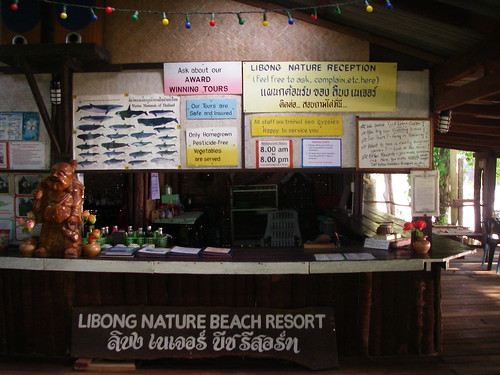Dugongs Of Libong: Orientation
The Libong Dugong resort comprises a fetching row of palm-thatch bungalows lining the beach, and they could still fit me in for 400 baht a night. However I had made a mistake in my choice of accommodation. They didn’t know anything about the dugongs.
The Libong Nature Beach Resort—situated on the other side of Lang Kow Village—costs a little more, but it’s the real thing. Run by a retired professor, every baht of the profits goes back into conservation and training of local people. As Prof. Laurence put it, “if I wanted to get rich, I would write books!”
The resort uses local fishing boats for their tours and 70% of the money goes straight back to the fishermen who own them. Another 15% are taxes, which Professor Laurence insists on paying. He instils on his staff the importance of paying taxes and insurance. Things are very different here from the West.
The resort is about a lot more than dugongs and birds. There is a women’s batik group that now trades through Oxfam. Accounting is carried out by volunteers so that the books remain transparent. At present there is Simon, a Swedish web programming student, here for 3 months for “a bit of a change”. Sadly I failed to convince him to ditch the computers and study dugongs instead.
The resort is respectful of the local Muslim culture. You can buy beer at the bar, but there is no dancing or music and the bar shuts early. Pork is off the menu. The Professor is opposed to expanding the amenities which would attract more tourists but put a strain on both the environment and the community. Instead of scooters, he rents out bicycles. Plastic bottles are not used in the restaurant.
I don’t think I have to say that I was won over the moment I got talking to Professor Laurence and Simon. I moved my stuff across as soon as I could.
Tags: Dugongs, SE Asia, Travel, Tag Index

January 18th, 2010 at 06:58
[…] Dugongs Of Libong: Orientation […]
May 16th, 2010 at 11:40
[…] The resort regularly receives volunteers who come to learn about life in the Sea Gypsy community, ecotourism and the local wildlife. They take part in various tours and activities, help with looking after the guests—mainly with translation and advise—and keep the books, for as the Professor said, an open book policy is fundamental to the charity’s goals. […]